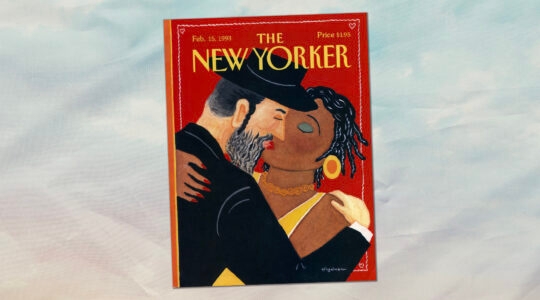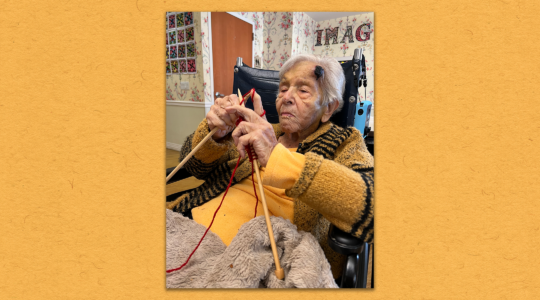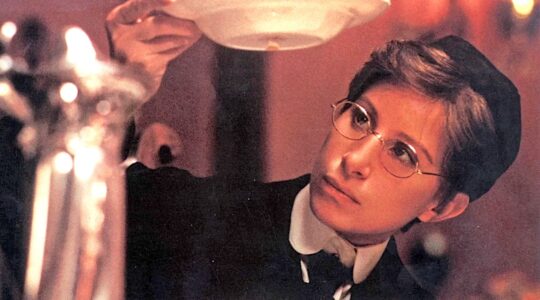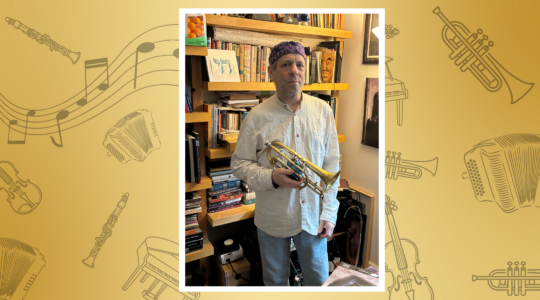As an estimated 3,000 people rallied against “The Death of Leon Klinghoffer,” saying that the opera glorifies anti-Semitism and terrorism, Andrew Gordon took a moment before attending the production to discuss what he expected to see.
Standing in line with other ticket holders, who had to pass through at least two police barriers to enter the Metropolitan Opera, Gordon said the opera’s original text, written in 1991, included “a lot of things not to like.” But he noted that the opera’s current producers had changed the libretto, eliminating one especially “egregious scene,” and that he believed the work was much more palatable as a result.
“I think I’ll find that the Jews are portrayed as the heroes and that the Palestinian terrorists are displayed as terrorists,” he told The Jewish Week. “I think there’ll be no doubt who the heroes and who the villains are. That’s my expectation.”
Gordon made his comments Monday night, shortly before the Met’s premiere of the opera, and as a firestorm of criticism aimed at the Met appeared to reach a crescendo.
Unprecedented in the company’s 134-year history, the controversy included Monday’s rally in a small, triangular park across from Lincoln Center, the Met’s home. The rally was organized by a coalition of groups, most of them on the Jewish right, and drew more than a dozen elected officials and former officials, including former Mayor Rudolph Giuliani. But it failed to attract many of the more established Jewish organizations, a source of ire for many of the protesters.
“The Met, and those who decide to go see this production, have every right to do so, and it would be hypocritical and anti-American for us to interfere with that and to stop that,” said Giuliani, a known opera buff and a Republican. “They have that right. But we also have a right, just as strong and just as compelling, to point out the historical inaccuracy and the historical damage this contributed to.”
The former mayor also called the opera a “sin” for offering what he called a “sympathetic justification for the killing of Leon Klinghoffer,” an American Jew who, with his wife, was aboard an Italian cruise ship, the Achille Lauro, when it was hijacked by members of the Palestine Liberation Organization in 1985. Klinghoffer, 69 and confined to a wheelchair, had nothing to do with the Israeli-Palestinian conflict, but the hijackers shot him in the head and chest and ordered his body thrown overboard, along with his wheelchair.
That history was recalled at the rally, some protesters brought along wheelchairs to symbolize Klinghoffer’s death.
One of those protesters, Hillary Barr, identified herself as a member of Mothers Against Terrorism, a group formed after 9/11, and called the opera “vehemently anti-Semitic.” She said the wheelchair next to her had been used by Rabbi Avi Weiss, a well-known Jewish activist and founder of the Coalition for Jewish Concerns-AMCHA, during a daylong vigil he conducted in the park before the rally. Barr said the rabbi conducted a series of “teach-ins” during the vigil for Jewish day-school students and passersby.
Others at the rally included Ira Nosenchuk, an American retiree now living in Jerusalem, whose sign read “Ebola ‘Art’ is Deadly,” and Rabbi Eliot Pearlson, who had traveled earlier that day from Miami Beach to attend the protest.
Rabbi Pearlson, the spiritual leader of a traditional shul, said he delivered a sermon about the opera on Yom Kippur and that he traveled to the city with 10 members of his congregation. He’s had a long history of Jewish activism, he said, “but, more important, I belong to a generation that will no longer sit idly by as Jews are attacked — and, make no mistake about it, this is an attack on the Jewish community.”
Protesters like Barr and Rabbi Pearlson listened to such speakers as former New York Gov. George Pataki and U.S. Rep. Peter King (L.I.), both Republicans, and U.S. Reps. Carolyn Maloney (Manhattan) and Eliot Engel (Bronx), both New York Democrats. They also heard Rabbi Joseph Potasnik, executive vice president of the New York Board of Rabbis, whose organization was one of the few at the rally representing the mainstream Jewish community.
One prominent figure who attended the rally but didn’t speak, even after he was invited to do so, was Alan Dershowitz, the ex-Harvard Law School professor.
Dershowitz said he declined to speak because he didn’t want to participate in any event “calling for censorship or stopping the opera. They [the Met] have the right to stage this opera just like they have the right to stage an opera glorifying the Nazis or the Ku Klux Klan,” Dershowitz said, noting that he once famously defended the right of neo-Nazis to march in Skokie, Ill., the home of many Holocaust survivors.
At the same time, Dershowitz said he felt compelled to protest the opera, which he called a “despicable” piece of work that “glorifies terrorism.”
Groups sponsoring the rally included the Zionist Organization of America, the Wiesenthal Center and Americans for a Safe Israel, as well as a handful of local synagogues and Jewish day schools.
Other, more mainstream organizations criticized the opera but distanced themselves from the rally because they believe the rally’s organizers couldn’t be trusted, according to a source familiar with the situation. The source, who declined to be identified by name, recalled that some of the protest’s organizers had called for defunding the Met at an earlier rally, held last month.
The source also cited a speech delivered at the September rally by Jeffrey Wiesenfeld, one of the protest’s organizers, in which he warned leaders of the Met: “You will be made to destroy that set. We will demand it. It doesn’t belong in this city. We are going to be back here — everyone here and many, many more — every night of the ‘Klinghoffer’ opera until the set is burned to the ground.”
Other forms of protest in the past few weeks have included the screening of a movie about Klinghoffer’s murder, an event hosted Monday night by the JCC in Manhattan, and an open letter to Peter Gelb, the Met’s general manager. The Jewish Community Relations Council of New York organized both activities, said Hindy Poupko, the organization’s managing director. She noted that the letter was signed by leaders of more than a dozen Jewish groups, including UJA-Federation of New York, Hadassah and the Orthodox Union.
In addition, the Anti-Defamation League has played a key role in protesting the opera, succeeding in persuading the Met to cancel a global simulcast of the opera planned in November and in eliminating portions of the opera. The ADL, meanwhile, has said it doesn’t consider the opera anti-Semitic, but that it gives the same weight to terrorists as it does to the victims.
During the opera’s premiere, members of the audience — some of whom tried to purchase blocs of tickets — booed the performance. One man shouted “The murder of Klinghoffer will never be forgiven” several times, and a woman screamed a vulgarity, according to accounts from The New York Times and opera patrons interviewed by The Jewish Week. At least one person recited Kaddish during the performance.
In addition, a special website created by the Met to discuss the controversy drew comments from people who had seen the premiere.
One comment on the Met’s website, “Join the Conversation,” came from Rabbi Eric Hoffman of Stamford, Conn., who wrote that although the opera “reflects the horror and criminality of the terrorists” and their equation of anti-Zionism with anti-Semitism, “it does not provide the case for Israel.” Instead, he continued, it “gives the impression that Jews can be treated sympathetically only as powerless victims but not as claimants to their own independent country.”
In an interview with The Jewish Week, Rabbi Hoffman stressed that he has been a regular Met attendee for years and that all the criticism heaped on the Met after it chose to produce this opera almost felt “as if a member of my family were saying something anti-Semitic.” For that reason, he decided to see the opera for himself, the rabbi said, adding that his “skin crawled” at the end when the terrorists were let go and “walked off the stage. … It showed the horror of releasing these people into the general population without any punishment.”
Patrons leaving the opera house Monday night who spoke to The Jewish Week offered a mixed reaction to the opera.
One woman, declining to give her name, said it was “long and boring.” But it was also “very anti-Palestinian,” she said. “It definitely pictures the Palestinians as murderers and terrorists.”
But Rabbi Irwin Kula, president of CLAL-The National Center for Jewish Learning and Leadership, called the opera a “tour de force inviting compelling conversation about the Israeli-Palestinian conflict.”
“Whatever side you’re on in this conflict, this opera would upset you,” Rabbi Kula said. “If you were a Palestinian watching this, what you saw were Palestinian murderers who thought, because they had a grievance, they could justify the murder of a wheelchair-bound victim who had nothing to do with the conflict.” In fact, the rabbi said, he was surprised that Palestinians weren’t in front of the Met protesting the opera, as well.
He added that what upsets many Jews is “that we’re not innocent in this conflict. And that’s the tragedy of the moment — both sides believe they’re completely innocent, and both sides believe the other side is completely guilty. … The real question is, is anyone ready to hear the partial truth of the other side.”
Reached by phone, Andrew Gordon said that the production both met and failed to meet his expectations. Several portions of the opera were very powerful, including the aria sung by Mrs. Klinghoffer, as well as much of the second act.
But he was surprised that “in something called ‘The Death of Klinghoffer’ that most of the arias were sung by the Palestinians,” Gordon said. And in the aria sung by Mr. Klinghoffer after he died, “presumbly while he was being pushed into the ocean,” he talks about tables and chairs falling into disrepair — “so mundane as to be ridiculous,” Gordon continued. He would have expected Klinghoffer “to sing something noble — about what he tried to do, about his life, about how he envisions the future of Israelis and Palestinians.”
Staff writer Stewart Ain contributed to this article.
The New York Jewish Week brings you the stories behind the headlines, keeping you connected to Jewish life in New York. Help sustain the reporting you trust by donating today.




